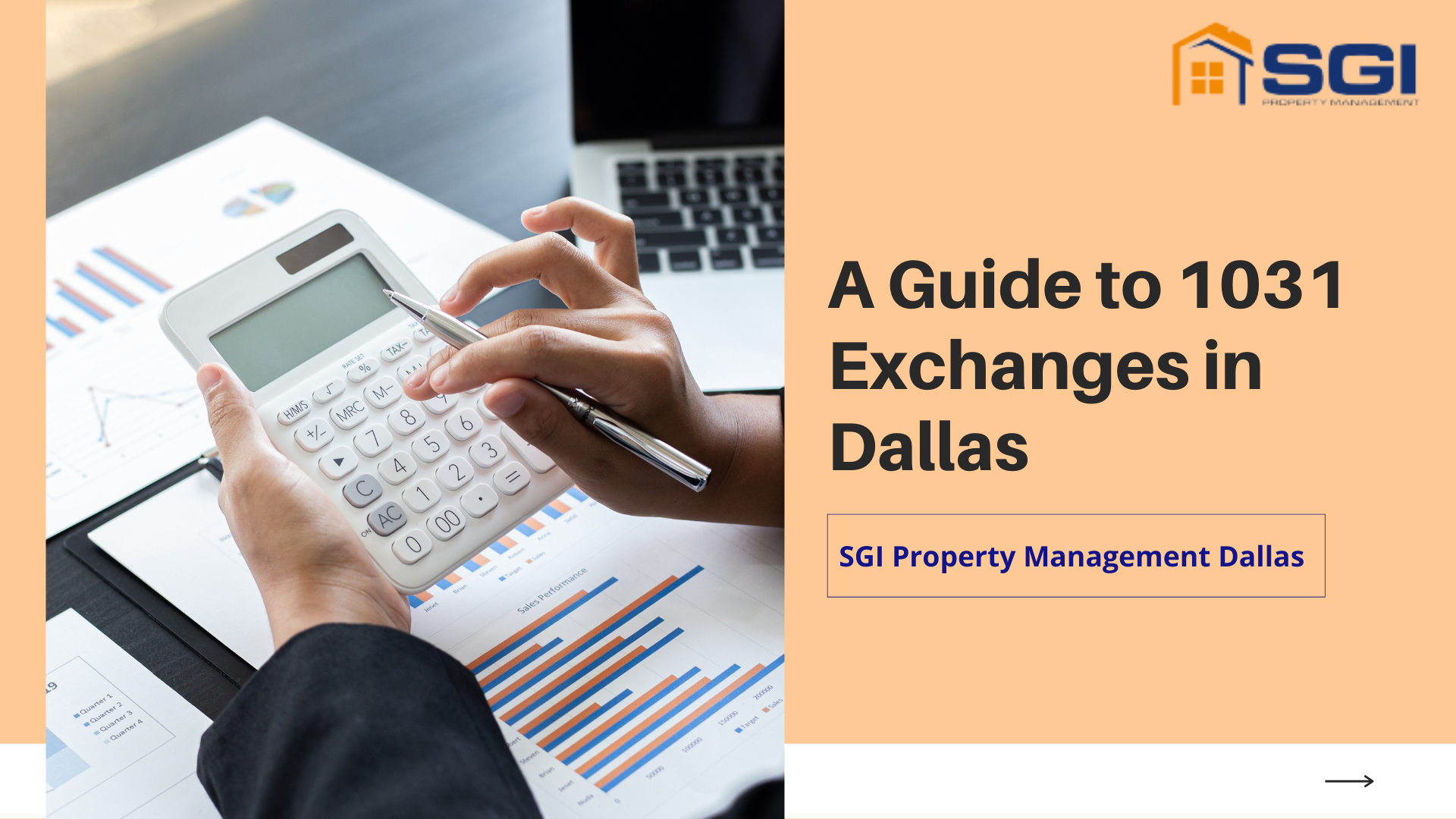
Usually, the Internal Revenue Service will levy a tax on the sale of a personal property or other investment. This tax could run as high as 30% when you combine both federal and state taxes.
Luckily, there is a way around this tax on your federal income tax return for Dallas-Fort Worth, Texas real estate investors! Our property exchange services can help you get on top of funds including tax-deferred exchanges for your Texas real estate.
While investors eventually have to pay these taxes for your Dallas, Texas rental business, they may be able to defer payment almost indefinitely, and potentially avoid paying these taxes altogether! This capital gains tax deferral is what is referred to as a 1031 Exchange.
The term ‘1031 Exchange’ takes its name from Section 1031 of the Internal Revenue Service Code. Many savvy Texas real property owners have capitalized on the 1031 Exchange or tax-deferred exchange to significantly grow their real estate investments.
The following is a guide to help you do a Texas 1031 Exchange for your real estate investment property.
What Properties Qualify for a 1031 Exchange?
Not all properties in the Texas real estate market are qualified under Section 1031 of the Revenue Code. The Internal Revenue Code requires that real property be used for business purposes in order to qualify for a 1031 Exchange. Maximize income by learning about exchanges. A personal property is not considered for a Texas 1031 exchange. A personal property is a property that is not used for business or investment.
Also, in addition to being used either as a business property, the IRS requires that properties be like-kind for a 1031 Exchange in Texas. Investment properties that are considered as a replacement property are those that share the same nature or character, even if they may not share the same grade or quality.
![1031 exchange rules dallas tx]](/images/blog/1031%20exchange%20rules%20dallas%20tx.jpg)
Below are examples of Texas real estate swaps that would fit the requirement of “like-kind” and result in a successful exchange.
- An office in exchange for a single-family home
- Raw land in exchange for apartment buildings
- Raw land in exchange for an office building
- A shopping center in exchange for an industrial building
As already mentioned, not all kinds of properties qualify for a Texas 1031 Exchange. Personal properties, for instance, don't qualify for a like-kind exchange because they aren't considered business or investment properties. Neither would a fix-and-flip property, as it’s solely purchased for resale.
Other kinds of investments that don’t qualify include:
- Inventory and certificates of trust
- Partnership interests
- Debt instruments
- Stocks
- Bonds
If you exchange these types of assets, the 1031 exchange would not only fail but you’d also have to pay tax on capital gains. Maximize income by knowing the rules of 1031 exchanges and strategies.
What Are the Purchase Deadlines Under IRS Section 1031?
There are deadlines that you must abide by when it comes to swapping properties. There is the 45-day and the 180-day rule. These periods are strict and cannot be extended.
45-Day Rule
The first timing restriction imposed by the IRS for the 1031 Exchange is the 45-day rule. According to this rule, you have 45 days from the date of sale of the relinquished property to identify its potential replacement.

You have two options when it comes to the number of properties you can identify. In the first option, you can identify a maximum of three properties. It doesn’t matter how much they’re worth.
Suppose, for instance, that you sell a condominium for $100,000. Under the IRS Code, you could list three $3 million dollar offices for exchange. Obviously, closing on them might be challenging if what you’re selling is a $100,000 property, but on paper, it’d check out.
The second option you have is to identify multiple properties (a minimum of three). If you go with this option, then the total value must not exceed twice the value of the relinquished property.
Let’s use the previous example of a $100,000 condo. The total value of the potential replacement properties must not exceed $200,000. So, if you sell the $100,000 condo, then you’d be able to purchase five replacement properties each worth $40,000.
180-Day Rule
The other deadline to abide by when conducting a Texas 1031 Exchange is the 180-Day rule. This rule states that an investor must complete the entire real estate transaction within 180 days. The period runs concurrently with the 45-day identification rule.

The 180-day period starts from the moment you sell the property you’re relinquishing. This, therefore, means that you have 135 days (180-45) to close on the replacement property. It goes without saying that the property you close on must be one from your 45-day list.
Who Is a Qualified Intermediary and What Is Their Role?
A Qualified Intermediary (QI) is a third party who coordinates a 1031 Exchange. They will help you sell a relinquished property and buy the replacement property on your behalf. As a matter of fact, the IRS Code requires that an investor doesn’t keep any funds involved in the 1031 Exchange transaction.
A QI can be a broker, a real estate agent, an attorney, or a CPA.
What Is a “Boot” in a 1031 Exchange?
Boot refers to non-like-kind property received in a 1031 Exchange. In other words, it’s any additional fair market value that’s received when a replacement property is acquired. The following are some tips on how to avoid a boot in a 1031 Exchange.
- Increase or maintain the debt amount on the replacement property.
- Make sure you reinvest all the proceeds from the relinquished property into the replacement property through actions such as conducting maintenance or renovations.
- Trade up in value. Ensure the replacement property is equal or greater value of the property you’re relinquishing.
- Either include personal property such as furniture and appliances in the purchase price or handle them in separate transactions.

- Bring cash with you on closing day to pay for items that aren’t like-kind exchanges. These items include things like tenant deposits, rent prorations, and outstanding vendor invoices.
What are the Different Types of 1031 Exchanges?
The following are the four types of 1031 Exchanges according to Section 1031 of the Internal Revenue Code.
- Simultaneous Exchange
- Improvement Exchange
- Delayed Exchange
- Reverse Exchange
Bottom Line
The IRS has very strict procedures on how a 1031 Exchange must be conducted. That’s why it's important to consult a tax advisor to minimize risk, especially if this is your first attempt at a 1031 Exchange!
SGI Property Management can help! We're the #1 property management company in the Dallas-Fort Worth area. With our investment property exchange services, the entire process will be smooth and easy as you work with our superior customer service.
We not only understand the 1031 Exchange process in Dallas and the Texas economy, but we’re also a full-service rental property management company with over 100 rental properties in our portfolio. Consult us to learn how we can help you grow your portfolio!









